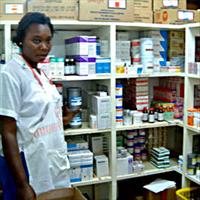BURKINA FASO: Some $450 million in medicines for “neglected” diseases

Pharmaceutical companies have pledged some US$450 million worth of medicines to Burkina Faso to fight “neglected” diseases that blind or otherwise debilitate millions of people in the country, according to the health minister.
Nearly 4,000 health workers are being deployed throughout the country to prepare for drug distribution and other education and prevention activities, health officials say.
The nationwide programme takes on five of what the World Health Organization (WHO) calls “neglected tropical diseases” or NTDs – lymphatic filiariasis, onchocerciasis, schistosomiasis, trachoma and intestinal worms.
While Burkina Faso has run programmes over the years to deal with some of the illnesses, the new effort is an integrated approach to tackling several at a time.
“This approach aims to coordinate our activities against these neglected illnesses, so we can increase the effectiveness, efficiency, reliability and sustainability of our efforts,” Health Minister Alain Yoda told the media and community leaders at the programme's launch on 8 January in Diapaga, 400 km east of the capital Ouagadougou.
“Burkina Faso and other developing countries are burdened more than others by these illnesses that cause death, disability and many other afflictions for the people,” he said. “The medicines exist but they are out of reach for those affected.”
One of the Pfizer medicines, for trachoma – the second cause of blindness in Burkina after cataracts – costs about 26,000 CFA francs (US$58) per dose, the country’s NTD programme manager Seydou Touré told IRIN.
Landlocked Burkina Faso, which lies at the southern edge of the Sahara desert, is one of the poorest countries on earth. In the latest UNDP Human Development Index Burkina was ranked 176th of 177 countries.
Many of the neglected tropical diseases thrive where there is poor sanitation, unsafe water and limited access to basic health care, WHO says. Only about 10 percent of Burkina’s 13.7 million people have adequate sanitation, according to government statistics.
The World Health Organization calls NTDs “a symptom of poverty and disadvantage” as they strike in the poorest and most marginalised communities.
They are called “neglected” because they are often less visible and receive a low priority compared to high-mortality diseases, even though they commonly cause chronic severe pain and life-long disability, WHO says.
Urinary schistosomiasis, a parasitic disease that can damage the bladder and kidneys, affects some 3 million people in Burkina Faso or nearly 25 percent of the population, according to the health ministry.
The US Agency for International Development (USAID) is supporting Burkina’s NTD programme, with the medicines being donated by pharmaceutical firms Pfizer, Merck and GlaxoSmithKline, some through the Mectizan Donation Programme, the Schistosomiasis Control Initiative and the International Trachoma Initiative.
The Burkina government is contributing 200 million CFA francs (US$450,000) -- about one-third of the operational costs.
Most of the donated medicines have already arrived in the country, according to NTD manager Toure. In the first phase, ongoing to early February, health workers are treating some 11 million people over age five for lymphatic filiariasis, onchocerciasis and intestinal worms.
The second phase in February and March aims to cover some 2.5 million people suffering from trachoma. And the final phase, from mid- to end of March, will have health workers distributing medicines to 6.6 million people for schistosomiasis, according to Health Minister Yoda.
The Burkina government and donors in 2007 carried out a pilot project in three districts to prepare for the programme, Toure said.
 Back and Next - Back and Next
Back and Next - Back and Next See Also - See Also
See Also - See Also